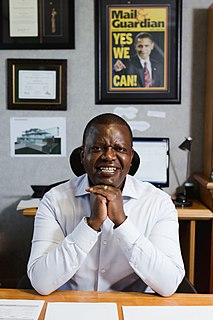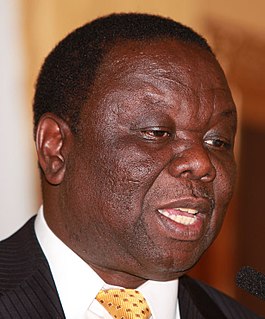Related Research Articles

Zimbabwe, officially the Republic of Zimbabwe, is a landlocked country located in Southeast Africa, between the Zambezi and Limpopo Rivers, bordered by South Africa to the south, Botswana to the south-west, Zambia to the north, and Mozambique to the east. The capital and largest city is Harare. The second largest city is Bulawayo. A country of roughly 15 million people, Zimbabwe has 16 official languages, with English, Shona, and Ndebele the most common. It was once known as the "Jewel of Africa" for its great prosperity.

The Gukurahundi was a genocide in Zimbabwe which arose in 1982 until the Unity Accord in 1987. It derives from a Shona language term which loosely translates to "the early rain which washes away the chaff before the spring rains".
Ndabaningi Sithole founded the Zimbabwe African National Union (ZANU), a militant organisation that opposed the government of Rhodesia, in July 1963. Sithole was a progeny of a Ndau father and a Ndebele mother. He also worked as a United Church of Christ in Zimbabwe (UCCZ) minister. He spent 10 years in prison after the government banned ZANU. A rift along tribal lines split ZANU in 1975, and he lost the 1980 elections to Robert Mugabe.

Josiah Magama Tongogara was a commander of the ZANLA guerrilla army in Rhodesia. He was the brother of current Zimbabwe President Emmerson Mnangagwa's second wife, Jayne. He attended the Lancaster House conference that led to Zimbabwe's independence and the end of white minority rule.
Jonathan Nathaniel Mlevu Moyo is a Zimbabwean politician who served in the government of Zimbabwe as Minister of Higher Education from 2015 to 2017. He was previously Minister of Information and Publicity from 2000 to 2005 and again from 2013 to 2015. He was elected to the House of Assembly of Zimbabwe as an independent candidate in 2005 and 2008. He is considered the core architect of the AIPPA and POSA restrictive legislation.

Trevor Vusumuzi Ncube is a Zimbabwean entrepreneur and newspaper publisher now living in South Africa and publishing in both countries. As an editor and publisher, he was a critical voice in media of former Zimbabwean President Robert Mugabe and his government.

Emmerson Dambudzo Mnangagwa is a Zimbabwean revolutionary and politician who has served as President of Zimbabwe since 24 November 2017. A member of ZANU–PF and a longtime ally of former President Robert Mugabe, he held a series of cabinet portfolios and was Mugabe's Vice President until November 2017, when he was dismissed before coming to power in a coup d'état. He secured his first full term as president in the disputed 2018 general election.

The Herald is a state-owned daily newspaper published in Harare, the capital of Zimbabwe.

Robert Gabriel Mugabe was a Zimbabwean revolutionary and politician who served as Prime Minister of Zimbabwe from 1980 to 1987 and then as President from 1987 to 2017. He served as Leader of the Zimbabwe African National Union (ZANU) from 1975 to 1980 and led its successor political party, the ZANU – Patriotic Front (ZANU–PF), from 1980 to 2017. Ideologically an African nationalist, during the 1970s and 1980s he identified as a Marxist–Leninist, and as a socialist after the 1990s.
Heidi Holland, also known as Heidi Hull, was a South African journalist and author who had been involved in the journalism industry for over 30 years. She edited Illustrated Life Rhodesia, worked as a freelance writer on publications such as The Sunday Times, The Telegraph, International Herald Tribune, The New York Times and The Guardian, and had also worked on research projects for British television documentaries. She was the author of various books, such as Dinner with Mugabe, an account of her meetings with Robert Mugabe, president of Zimbabwe. Previously she released The Colour of Murder, a critical analysis of the 2002 van Schoor murder trials in South Africa. She also released a book based on the history of South Africa's ruling party, The Struggle: A History of the African National Congress. She was found dead of an apparent suicide in her home near Johannesburg.
The Daily News is a Zimbabwean independent newspaper published in Harare. It was founded in 1999 by Geoffrey Nyarota, a former editor of the Bulawayo Chronicle. Bearing the motto "Telling it like it is", the Daily News swiftly became Zimbabwe's most popular newspaper. However, the paper also suffered two bombings, allegedly by Zimbabwean security forces. Nyarota was arrested six times and reportedly was the target of a government assassination plot. After being forced from the paper by new management in December 2002, Nyarota left Zimbabwe. The News was banned by the government in September 2003.
The media of Zimbabwe has varying amounts of control by successive governments, coming under tight restriction in recent years by the government of Robert Mugabe, particularly during the growing economic and political crisis in the country. The Zimbabwean constitution promotes freedom of the media and expression, however this is hampered by interference and the implementation of strict media laws. In its 2008 report, Reporters Without Borders ranked the Zimbabwean media as 151st out of 173.

Morgan Richard Tsvangirai was a Zimbabwean politician who was Prime Minister of Zimbabwe from 2009 to 2013. He was President of the Movement for Democratic Change, and later the Movement for Democratic Change – Tsvangirai (MDC–T), and a key figure in the opposition to former President Robert Mugabe.

The Chronicle is a popular daily newspaper in Zimbabwe. It is published in Bulawayo and mostly reports on news in the Matebeleland region in the southern part of the country. It is state-owned and therefore usually only publishes news that supports the government and its policies. It also covers stories on national and international news, as well as entertainment, sport, business, travel, job offers and real estate. It was established in 1894 and it was the largest newspaper in the country following The Herald.
Davison Maruziva is a Zimbabwean journalist and editor. Along with Geoffrey Nyarota, he broke the 1989 "Willowgate" scandal that resulted in the resignation of five government ministers, but was forced from his job with the state-owned Bulawayo Chronicle as a result. He later was an editor at Nyarota's Daily News, but resigned after Nyarota was forced out in December 2002. He then became an editor at the Independent Standard, and attracted international attention for his 2008 arrest for publishing an editorial by an opposition leader.
Willowgate was a 1988–89 Zimbabwean political scandal in which the Bulawayo Chronicle revealed illegal resale of automobile purchases by various government officials. The ensuing investigation resulted in the resignations of five members of President Robert Mugabe's cabinet. One of the five, Maurice Nyagumbo, later committed suicide after being charged with perjury. The reporters who had broken the story, Geoffrey Nyarota and Davison Maruziva, were subsequently removed from their posts.
Basildon Peta was the second journalist ever to be awarded the Media Institute of Southern Africa's Press Freedom Award for his reporting in Zimbabwe. In his homeland, Peta was persecuted and he fled for his life after receiving threats from the Robert Mugabe regime in 2001 and incurring a brief detainment in Harare before the April 2002 elections. Since his exile in February 2002 to South Africa, Peta has reported for newspapers in the United Kingdom and New Zealand. He currently writes editorials and is the owner of a newspaper publishing company in Maseru, Lesotho.
Zimbabwe Newspapers (1980) Limited, operating as Zimpapers, is a state-controlled Zimbabwean mass media company. Originally a newspaper Publishing company, in the 2010s it expanded its operations to include commercial printing, radio and television. The company's portfolio includes over a dozen Magazines and newspapers, including The Herald and The Chronicle, several radio stations, and a television network. It is the largest newspaper publisher in Zimbabwe.
William Sylvester Saidi was a Zimbabwean writer and journalist. Among his friends and family he was commonly known as 'Bill' Saidi. He died in Kitwe, Zambia after a long illness.
References
- 1 2 3 4 5 6 Winston W. Wiley (24 December 2006). "A defiant voice: African journalist delivers news from afar". Telegram & Gazette. Archived from the original on 20 December 2013. Retrieved 12 September 2012.
- 1 2 3 "Geoffrey Nyarota: a defiant voice". CNN. 16 August 2001. Archived from the original on 8 September 2012. Retrieved 12 September 2012.
- 1 2 3 4 5 "Geoffrey Nyarota, Zimbabwe". World Association of Newspapers. Archived from the original on 10 May 2012. Retrieved 12 September 2012.
- 1 2 Jane Perlez (20 January 1989). "Zimbabwe Reads of Officials' Secrets". The New York Times. Archived from the original on 2 February 2016. Retrieved 12 September 2012.
- 1 2 Karl Maier (15 April 1989). "3 Cabinet Ministers Quit in Zimbabwe as Corruption Report Is Published". The Washington Post. – via HighBeam Research (subscription required). Archived from the original on 2 February 2016. Retrieved 12 September 2012.
- 1 2 3 "Zimbabwe Crisis: Foreign journalist held over newspaper bomb". The Independent. – via HighBeam Research (subscription required). 28 April 2000. Archived from the original on 8 December 2012. Retrieved 12 September 2012.
- ↑ P.P. Jackson (2010). Shattered Dreams. AuthorHouse. pp. 52–3. ISBN 9781452043944.
- ↑ Lewis Machipisa (1 April 1999). "New Independent Daily Launched". Inter-Press Service – via HighBeam Research (subscription required). Archived from the original on 12 March 2016. Retrieved 12 September 2012.
- 1 2 3 4 5 Karen Breytenbach (12 June 2007). "Acclaimed Zim journalist pens harrowing, moving memoirs". The Cape Times.[ dead link ]
- ↑ "Zimbabwe 'murder plot' fails". BBC News. 1 August 2000. Archived from the original on 6 March 2016. Retrieved 12 September 2012.
- ↑ Steven Tsoroti (20 November 2001). "Independent Newspaper Battles Closure". worldpress.org. Archived from the original on 16 September 2012. Retrieved 12 September 2012.
- 1 2 "International Press Freedom Awards 2001". Committee to Protect Journalists. Archived from the original on 28 August 2012. Retrieved 11 August 2012.
- ↑ Angelique Serrao (2 September 2006). "Geoff Nyarota has fled from the despotic Mugabe regime, but he hopes to return one day". The Saturday Star. – via HighBeam Research (subscription required). Archived from the original on 19 March 2016. Retrieved 12 September 2012.
- ↑ "Geoffrey Nyarota of Zimbabwe awarded World Press Freedom Prize 2002". United Nations Educational, Scientific and Cultural Organization. 2002. Archived from the original on 29 September 2012. Retrieved 12 September 2012.